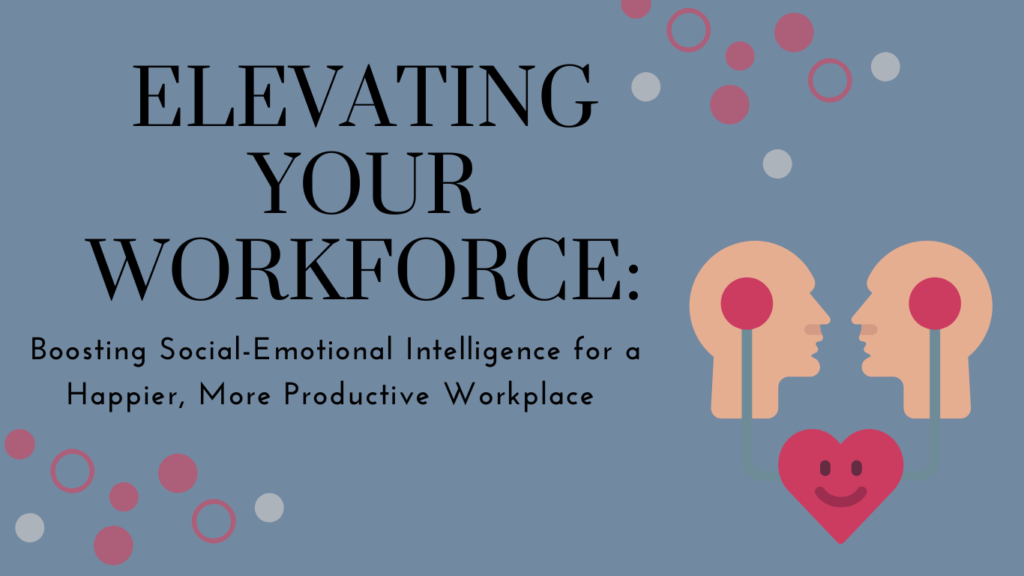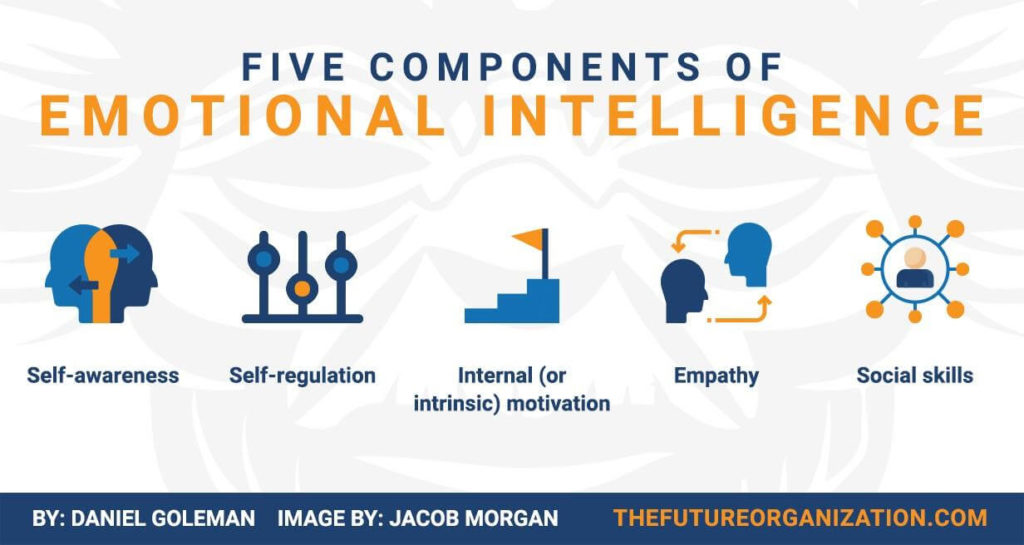Increasing the Social-Emotional Intelligence of your Workforce

In our fast-paced and ever-changing work environment, social-emotional intelligence (SEI) has become a crucial skill for employees to possess. SEI is the ability to recognize, understand, and manage our own emotions, as well as the emotions of others. It’s essential for building strong relationships, improving communication, and creating a positive work culture.
Investing in SEI development for your workforce not only benefits the individual employees but also leads to increased productivity, better teamwork, and higher job satisfaction. As a leader in your organization, it’s important to recognize the value of SEI and take steps to cultivate it within your team. Don’t miss out on the opportunity to enhance your workplace through SEI development. Follow our guide to boost social-emotional intelligence!
Social-emotional intelligence is the ability to understand and manage one’s own emotions, as well as the emotions of others. It involves being able to recognize and respond appropriately to different emotional states, and to communicate effectively with others in a variety of social situations.

Social-emotional intelligence is an important component of overall intelligence, as it plays a critical role in personal and professional success
In the workplace, social-emotional intelligence is essential for effective leadership, teamwork, and communication. Leaders who possess high levels of social-emotional intelligence are better able to build strong relationships with their team members, inspire trust and loyalty, and foster a positive work environment.
Team members with strong social-emotional intelligence are better able to work collaboratively, resolve conflicts, and communicate effectively with their colleagues. By prioritizing social-emotional intelligence in the workplace, individuals and organizations can build stronger, more productive teams and achieve greater success.
The 5 Components of Social-Emotional Intelligence
According to the book “Emotional Intelligence: Why It Can Matter More Than IQ” by the American psychologist, Daniel Goleman, social-emotional intelligence can be broken down into 5 components: self-awareness, self-regulation, internal or intrinsic motivation, empathy, and social skills.

Self-awareness
This is the ability to recognize and understand your own emotions, thoughts, and behaviors. It involves being able to accurately assess your strengths and weaknesses, and to have a clear understanding of how others perceive you. This skill is important because it helps you to better understand yourself and how you interact with others.
An example of self-awareness is recognizing when you are feeling overwhelmed and taking steps to manage your stress. Another example is being able to identify your own biases and prejudices, and working to overcome them.
Self-regulation
Self-regulation is when you can manage your emotions, thoughts, and behaviors in a way that is appropriate for the situation. It involves being able to control your impulses and emotions and to think before you act. This skill is important because it helps you to make better decisions and to maintain positive relationships with others.
A good way to self-regulate is taking a deep breath and counting to 10 before responding to someone who has made you angry. Also, is resisting the temptation to procrastinate and instead focusing on completing a task that needs to be done.
Internal or Intrinsic Motivation
Internal or intrinsic motivation refers to the ability to self-motivate and pursue goals without external rewards or incentives. This involves having a strong sense of purpose and passion for what one is doing.
For example:
- A writer who writes every day for the sake of loving writing, not just to make money or gain recognition.
- A student who studies hard because they are genuinely interested in the subject matter, not just to get good grades.
- An athlete who trains tirelessly because they are dedicated to their sport, not just to win competitions.
Empathy
Empathy is the ability to understand and share the feelings of others. This involves both cognitive and emotional components, as one must be able to recognize and understand another person’s emotions as well as feel a similar emotional response.
For example:
- A friend who listens to another friend’s problems and offers support and comfort.
- A therapist who works to understand their client’s experiences and feelings to provide effective treatment.
- A teacher who takes the time to get to know their students and understand their individual needs and struggles
Social Skills
Social skills are a crucial component of social-emotional intelligence. They refer to the ability to effectively communicate and interact with others in various social situations which helps us to build relationships, and collaborate with others. This includes listening actively, collaborating, and resolving conflicts constructively.
- Active listening involves paying attention to what someone is saying, asking clarifying questions, and responding appropriately.
- Collaboration involves working effectively with others towards a common goal.
- Conflict resolution involves finding solutions to disagreements respectfully and peacefully.
One of the great things about SEI is that it’s a transferable skill, which means that it can be taught and learned! How? Allow us to tell you!
Elevating Your Workforce: Boosting Social-Emotional Intelligence for a Happier, More Productive Workplace
Workplace environments that prioritize social-emotional intelligence tend to be more positive, productive, and engaging. Here are six effective ways to boost social-emotional intelligence at the workplace, along with corresponding activities to help you achieve the social and emotional balance you need at your workplace.
Start with Yourself
Remember the first component of social-emotional intelligence? Self-awareness! Therefore, it is essential to start with oneself when trying to boost social-emotional intelligence in the workplace, regardless of whether one is an employee, employer, or manager. By setting an example, one can inspire others to follow suit and create a positive work environment.

Yet, how can you become self-aware? Here are some ways to become more self-aware according to psychology:
- Practice mindfulness: This involves paying attention to your thoughts, feelings, and bodily sensations without judgment. By being present at the moment, you can gain insight into your inner workings and become more aware of your patterns and behaviors.
- Reflect on your values and beliefs: Take some time to consider what you truly care about and believe in. This can help you better understand your motivations and make decisions that align with your values.
- Seek feedback: Ask trusted friends, family members, or colleagues for feedback on your strengths and weaknesses. This can help you identify blind spots and areas for improvement.
- Keep a journal: Writing down your thoughts and feelings can help you process them and gain insight into your inner world.
- Practice self-compassion: Treat yourself with kindness and understanding, rather than harsh criticism. This can help you cultivate a more accepting and non-judgmental attitude towards yourself.
Remember that self-awareness is an ongoing process, and it takes time and effort to develop. By practicing these strategies, you can become more attuned to your thoughts, feelings, and behaviors, and make more intentional choices in your life.
Encourage Active Listening (To Understand, Not to Retaliate)
Encouraging active listening can be an effective way to boost social-emotional intelligence in the workplace. Active listening involves fully concentrating on what the other person is saying, rather than just waiting for your turn to speak. It requires giving the speaker your undivided attention, asking clarifying questions, and summarizing what they have said to ensure you have fully understood their message.

As an employer, you can set guidelines to encourage active listening among your employees. Start by modeling active listening to yourself and encouraging others to do the same. Incorporate active listening exercises in team meetings and training sessions to promote the practice.
Also, consider implementing regular team-building activities that involve listening exercises. For example, you could hold a “storytelling circle” where each team member shares a personal story while others practice active listening!
Promote Empathy
Empathy is a crucial trait that allows individuals to connect with others emotionally, and it’s an essential component of building positive relationships. In the workplace, empathy can foster a more collaborative and supportive environment. Empathetic leaders can create a culture where employees feel heard, valued, and supported, which can lead to increased productivity and job satisfaction.
To promote empathy in the workplace, you can implement a couple of strategies:
Perspective Taking
One effective approach is encouraging team members to put themselves in each other’s shoes. This can be done by holding a “perspective-taking” exercise where team members pair up and take turns sharing a difficult experience while the other listens and asks questions to better understand their perspective.
This exercise can help team members build a deeper level of understanding and empathy for one another, which can lead to improved communication and collaboration.
Community Service
Another approach to promoting empathy is to create opportunities for team members to volunteer together or participate in community service projects. These activities can help team members build a sense of camaraderie while also giving back to the community.
By working together towards a common goal, team members can build stronger relationships and develop a greater sense of empathy for others.
Encourage Collaboration
Encouraging collaboration in the workplace is a great way to boost social intelligence and emotional intelligence among team members. Assigning team projects that require everyone to contribute their unique skills and perspectives can help build meaningful relationships and foster a positive work environment.
Additionally, holding brainstorming sessions where team members work together to solve problems or generate new ideas can also encourage collaboration and improve team dynamics. By working together, team members can gain a better understanding of each other’s strengths and weaknesses, which can lead to more effective communication and improved problem-solving.
Encourage Open Communication
When team members feel comfortable expressing their thoughts, opinions, and feelings, they are more likely to build trust, foster positive relationships, and work collaboratively towards a common goal. To promote open communication, it is essential to create an environment where team members feel safe to share their ideas and feedback.

Hold regular meetings
One effective way to encourage open communication is to hold regular team meetings. These meetings provide an opportunity for each member to share their thoughts and feedback on current projects, challenges, and ideas for improvement.
By giving everyone a chance to speak, you can ensure that all perspectives are heard and valued. Additionally, team meetings can be a great way to celebrate successes and acknowledge the hard work of team members. This recognition can boost morale and create a positive team culture.
Suggestion Boxes
Another way to promote open communication is to implement a “suggestion box” where team members can anonymously submit ideas and suggestions for improving the workplace environment. By providing a safe and anonymous way to share feedback, team members who may be hesitant to speak up in person can still contribute to the conversation.
This can lead to valuable insights and ideas that might not have been shared otherwise. Additionally, by taking action on the suggestions received, you can demonstrate to your team that their feedback is valued and that you are committed to creating a positive and productive work environment.
Practice Mindfulness
Formally introduced in 1970 by Jon Kabat-Zin as a form of therapy, mindfulness has gained track since then. Practicing mindfulness can have significant benefits for individuals and teams in the workplace, including increased social-emotional intelligence. By being fully present at the moment and engaged in the task at hand, team members can improve their ability to communicate effectively, build relationships, and manage stress.
Here are some tips for practicing mindfulness in the workplace:
- Start with short breaks: Encourage team members to take short breaks throughout the day to engage in mindfulness exercises. This can include simple practices like taking a few deep breaths or stretching or more structured practices like guided meditations or mindful breathing exercises.
- Create a calm environment: Designate a quiet space in the workplace where team members can go to practice mindfulness. This could be a meditation room, a quiet corner, or even just a few chairs set up in a peaceful area. Make sure the space is comfortable and free from distractions.
- Incorporate mindfulness into team meetings: Start each meeting with a brief mindfulness exercise to help everyone focus and be fully present. This could be as simple as taking a few deep breaths together or doing a quick guided meditation.
- Encourage self-reflection: Encourage team members to take time each day to reflect on their thoughts and emotions. This can help them become more aware of their feelings and reactions, which can improve their ability to empathize with others and communicate effectively.
By incorporating mindfulness practices into the workplace, teams can improve their social-emotional intelligence and create a more positive and productive work environment.
Takeaway
Social-emotional intelligence is crucial for creating a positive and healthy work environment that fosters growth and productivity. By investing in social-emotional intelligence, companies can reap numerous benefits, including improved teamwork, stronger relationships, and increased job satisfaction. Furthermore, employees with high social-emotional intelligence are better equipped to navigate difficult situations and resolve conflicts constructively and respectfully.
By prioritizing this aspect of the workplace, companies can create a culture that values empathy, understanding, and communication. We invite you to take action now to boost the social-emotional intelligence of our workforce and create a better tomorrow for ourselves and our colleagues!
-The Monitask Team


